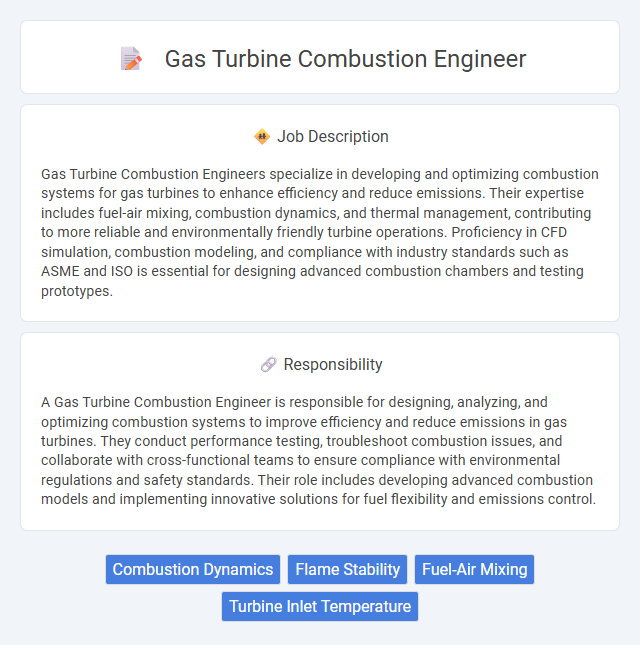
Gas Turbine Combustion Engineers specialize in developing and optimizing combustion systems for gas turbines to enhance efficiency and reduce emissions. Their expertise includes fuel-air mixing, combustion dynamics, and thermal management, contributing to more reliable and environmentally friendly turbine operations. Proficiency in CFD simulation, combustion modeling, and compliance with industry standards such as ASME and ISO is essential for designing advanced combustion chambers and testing prototypes.
People with strong analytical skills and a passion for thermodynamics are likely suitable for a Gas Turbine Combustion Engineer role. Those comfortable working in high-pressure environments and adept at problem-solving under technical constraints may find this job aligns well with their abilities. Candidates lacking attention to detail or interest in combustion processes may have difficulty adapting to the demands of this position.
Qualification
A Gas Turbine Combustion Engineer typically holds a Bachelor's or Master's degree in Mechanical Engineering, Aerospace Engineering, or a related field, with specialized coursework in thermodynamics, fluid mechanics, and combustion science. Proficiency in computational fluid dynamics (CFD) software and experience in high-temperature materials and chemical kinetics are essential for optimizing gas turbine performance. Candidates often require hands-on experience in engine testing, emissions analysis, and compliance with environmental regulations to effectively enhance combustion efficiency and reduce pollutant output.
Responsibility
A Gas Turbine Combustion Engineer is responsible for designing, analyzing, and optimizing combustion systems to improve efficiency and reduce emissions in gas turbines. They conduct performance testing, troubleshoot combustion issues, and collaborate with cross-functional teams to ensure compliance with environmental regulations and safety standards. Their role includes developing advanced combustion models and implementing innovative solutions for fuel flexibility and emissions control.
Benefit
Gas Turbine Combustion Engineer roles likely offer competitive salaries and comprehensive benefits packages, including health insurance and retirement plans, enhancing financial security. Opportunities for professional development and skill advancement may contribute to career growth in the aerospace or energy sectors. Work environments might provide cutting-edge technology exposure, promoting innovation and job satisfaction.
Challenge
Gas Turbine Combustion Engineers likely face complex challenges in optimizing combustion processes to improve efficiency and reduce emissions. They probably encounter difficulties balancing performance with environmental regulations and fuel variability. Problem-solving and innovative design approaches might be essential to address thermal stresses and maintain reliability under high operating conditions.
Career Advancement
Gas Turbine Combustion Engineers specialize in optimizing combustion processes to enhance efficiency and reduce emissions in gas turbine engines. Mastery of computational fluid dynamics (CFD) and advanced combustion modeling accelerates career growth, leading to roles such as Senior Combustion Engineer or Combustion Research Manager. Expertise in materials science and regulatory compliance further opens pathways toward project leadership and cross-disciplinary innovation within aerospace and power generation industries.
Key Terms
Combustion Dynamics
Gas Turbine Combustion Engineers specializing in combustion dynamics analyze and optimize flame stability, heat release patterns, and acoustic oscillations within turbine combustors to enhance performance and reduce emissions. Expertise in advanced simulation tools and experimental diagnostics is critical for understanding complex thermo-acoustic interactions and mitigating risks of combustion instabilities. Proficient knowledge of fuel-air mixing, combustion kinetics, and control strategies drives innovations in low-emission, high-efficiency gas turbine designs.
Flame Stability
Gas Turbine Combustion Engineers specialize in optimizing flame stability to enhance engine performance and reduce emissions. They analyze combustion dynamics, fuel-air mixing, and temperature distribution to prevent flame blowout or flashback. Expertise in advanced computational fluid dynamics (CFD) and combustion testing ensures reliable, efficient turbine operation under varying conditions.
Fuel-Air Mixing
Gas Turbine Combustion Engineers specialize in optimizing fuel-air mixing to enhance combustion efficiency and reduce emissions in gas turbines. They utilize advanced computational fluid dynamics (CFD) simulations and experimental techniques to design and analyze combustor geometries that ensure uniform fuel distribution and optimal air flow patterns. Expertise in fuel atomization, spray characteristics, and combustion kinetics is critical to improving fuel-air mixing performance and turbine reliability.
Turbine Inlet Temperature
Gas Turbine Combustion Engineers specialize in optimizing the turbine inlet temperature (TIT) to enhance engine efficiency and reduce emissions. Precise control of TIT is crucial for maintaining material integrity and achieving optimal combustion performance in high-temperature environments exceeding 1500degC. Advanced simulation tools and materials innovation are central to managing thermal stresses and improving turbine lifespan.
 kuljobs.com
kuljobs.com